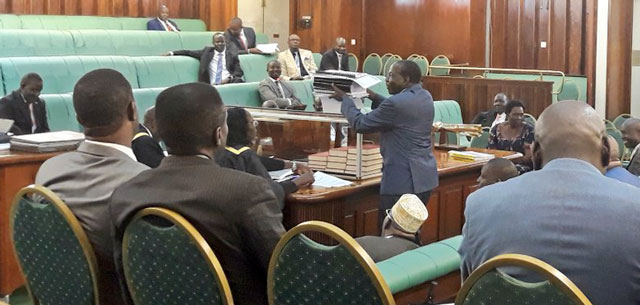
Kampala, Uganda | THE INDEPENDENT | Before the National Economy committee of Parliament discusses up to sh2.5 trillion in loans requests, there is increasing concern about the levels of government borrowing, despite assurances by the Finance Minister that the Uganda’s debts are still manageable.
Parliament discussed and forwarded up to 10 loan requests worth 2.5 trillion Shillings for consideration to the National Economy committee in the wake of the Coronavirus (COVID-19).
The 10 loan requests were introduced by the Ministry of Finance to Parliament in the month of June alone. They came just a month after Parliament approved another 2.9 trillion Shillings to mitigate the effects of COVID-19.
They included a loan request of 628 billion Shillings from the International Development Association (IDA) of the World Bank to support irrigation for the climate-resilient project, 111 billion Shillings from Exim Bank of India for supply and installation of solar powered water pumping systems for areas with lowest safe water coverage.
The other is a loan request of 873 billion Shillings from the African Development Bank to finance the construction of three major national roads of Namagumba-Budadiri and Nalugugu of 29 kilometres, Katuna-Muko-Kamuganguzi of 104 kilometres, and 37 kilometres of Laropi-Moyo-Afoji on the South Sudan border.
The other was a loan request of 254 billion Shillings from the African Development Fund to finance the Kabale-Lake Bunyonyi-Mgahinga road upgrading project, and 289 billion Shillings from AFD for Water and Sanitation in Isingiro.
The ministry also sought a loan of 31 billion shillings from UNICREDIT Bank of Austria for the construction and equipping of an Oncology and diagnostic centre in Gulu district and a guarantee to Uganda Development Bank (UDB) to borrow 318 billion Shillings from European Investment Bank, International Islamic Trade Finance cooperation, OPEC fund for International Development and the Arab Bank for Economic Development in Africa and Kuwait fund for Arab Economic Development.
These loans are now before the National Economy committee of Parliament. Although there are concerns that the government is over-borrowing, the Finance Ministers have told the country that Uganda’s debts are still manageable.
However, Uganda Debt Network says Uganda’s borrowing does not appear to be adequately planned since some loans take years to be used even after it has been borrowed at huge interest rates.
Julius Kapwepwe of Uganda Debt Network says that as the civil society, they remain concerned about the huge and ever-increasing appetite for loans, that include commercial loans that are piled on Ugandans at very high-interest rates.
Kapwepwe says that it is also unfortunate that Government is borrowing against low utilization of some loans, like loans of rural electrification. He says Government is also not discussing with Ugandans who are the recipients of the loans or beneficiaries to inform them of the magnitude of specific loans acquired. He says the loans also face accountability issues since they are in trillions. Kapwepwe says now Uganda should look at less borrowing and see prudent use of its domestic resources.
Kachumbala County MP and Vice Chairperson of the budget committee Patrick Isiagi Opolot says that such borrowing is worrying, saying the rate of borrowing for the Government has gone high.
Opolot says that Uganda is now tending to a dangerous loan level, and as MPs, they are waiting for the assessment of the committee on National economy on loans and this should guide the house on how they can proceed.
****
URN
 The Independent Uganda: You get the Truth we Pay the Price
The Independent Uganda: You get the Truth we Pay the Price





